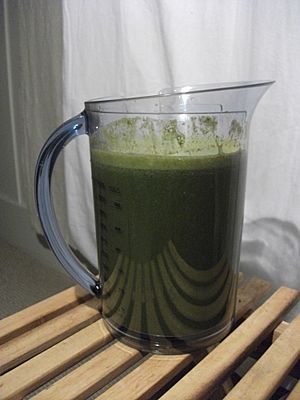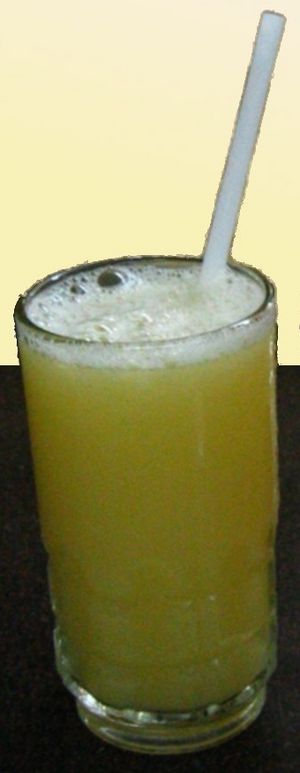Juice fasting facts for kids
Juice fasting, also called juice cleansing, is a special eating plan. People on this plan drink only fruit and vegetable juices. They do not eat any solid food.
Some people try juice fasting because they believe it helps their body get rid of bad things. This idea is part of alternative medicine. Juice fasts often last from one to seven days. They can include many different fruits, vegetables, and even spices. These are often not the usual juices you find in stores. People who promote juice fasting often make claims about its health benefits that are not proven by science.
Contents
How Did Juice Fasting Start?
Juice fasting became popular in the United States thanks to Norman W. Walker and Jay Kordich. They helped turn drinking juice into a diet trend.
Norman Walker's Contributions
Norman Walker is seen as one of the first people to promote juice cleanses. He helped create new ways to make juice. He also supported eating mostly raw foods. In 1936, Walker designed the first mechanical juicer. He called it the NorWalk. A newer version of his invention, the Norwalk 280, is still sold today. It costs about US$2,495. Walker also wrote many cookbooks. These books encouraged a raw, mostly liquid diet.
Jay Kordich and the Juiceman
Jay Kordich became famous with his book, The Juiceman’s Power of Juicing. This book became a best-seller. In the 1990s, Kordich was a TV spokesperson. He talked about the health benefits of a juice diet. Kordich also appeared in TV commercials for his Juiceman Juicer. He claimed these sales made over US$300 million. Walker's and Kordich's work helped juice fasting become what it is today.
Juice Fasting Today
In the 2000s, juice fasting has stayed popular. Many people still believe that juice cleanses can "detox" their bodies. Celebrities and other people sharing their diets online have also made this lifestyle more common.
Are There Real Health Benefits?
Claims about the health benefits of juice fasting are not supported by science. Experts say that the idea of "detox" is a marketing idea, not a real body process.
What Experts Say
Catherine Collins is a chief dietician at St George's Hospital Medical School in London. She says that the idea of a "detox" is a myth. She also states that drinking many vitamins and minerals for a few days does not give long-lasting health benefits.
Potential Risks of Juice Fasting
Detox diets, including juice fasts, can be risky. They might cause health problems. For example, people might feel dizzy or faint because their blood pressure drops suddenly. Diarrhea can also happen, leading to dehydration. This means your body loses too much water. It can also upset the balance of important salts in your body. If someone does a juice fast for a long time without a doctor's help, they might not get enough protein or calcium.
The American Cancer Society has also said that there is no scientific proof. They state that juice cleansing does not lower cancer risk or offer other health benefits.
See also
- List of diets
- List of ineffective cancer treatments
- Fat, Sick and Nearly Dead
- Green smoothie
- Fruitarianism
- Juicing
- Juicer
- Raw veganism
- Raw water § Raw water dieting
 | DeHart Hubbard |
 | Wilma Rudolph |
 | Jesse Owens |
 | Jackie Joyner-Kersee |
 | Major Taylor |



